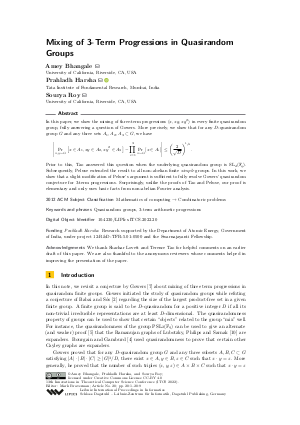@InProceedings{bhangale_et_al:LIPIcs.ITCS.2022.20,
author = {Bhangale, Amey and Harsha, Prahladh and Roy, Sourya},
title = {{Mixing of 3-Term Progressions in Quasirandom Groups}},
booktitle = {13th Innovations in Theoretical Computer Science Conference (ITCS 2022)},
pages = {20:1--20:9},
series = {Leibniz International Proceedings in Informatics (LIPIcs)},
ISBN = {978-3-95977-217-4},
ISSN = {1868-8969},
year = {2022},
volume = {215},
editor = {Braverman, Mark},
publisher = {Schloss Dagstuhl -- Leibniz-Zentrum f{\"u}r Informatik},
address = {Dagstuhl, Germany},
URL = {https://drops.dagstuhl.de/entities/document/10.4230/LIPIcs.ITCS.2022.20},
URN = {urn:nbn:de:0030-drops-156163},
doi = {10.4230/LIPIcs.ITCS.2022.20},
annote = {Keywords: Quasirandom groups, 3-term arithmetic progressions}
}

 Creative Commons Attribution 4.0 International license
Creative Commons Attribution 4.0 International license
